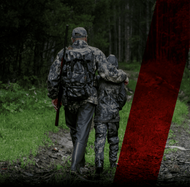Tips to Keep in Mind While Mentoring a New Hunter
Posted by Ranger Point Team on Aug 19th 2021
Introduction
Mentoring a new hunter is something every veteran hunter considers at one time or another. It’s often about teaching a child or grandchild to hunt and passing down the family hunting tradition.
Let’s not forget about adults, male or female. You would be surprised how many women want to hunt. Adults are also more likely to continue hunting on their own once they get through the basics. This adult will, in turn, pass on the hunting passion to their children.
The number of people who buy hunting licenses is in steep decline and has been for many years. From both a sporting and a conservation point of view, this should scare all of us.
Points to Remember Before Mentoring a New Hunter
Are you the right person to mentor a new adult hunter?
It’s one thing to go hunting by yourself. Teaching someone else is something different. We take many hardships while in the field for granted and have even learned to appreciate them at times. A new hunter will not.
When we get out there into the field, we’re all serious about the hunt and concentrated. When we’re showing a newbie the world of hunting, we need to step back in time, relax and recall how overwhelming it was on our first outing.
A veteran hunter’s expectations are high. While mentoring a person new to the hunting experience, we have to calm those expectations and remember our partner doesn’t benefit from years of experience and knowledge.
Can you slow down for someone else and not let your enthusiasm and competitiveness take charge?
While taking your mentee out to set up the blind or stand, spend extra time talking about the animals, the environment, safety, and other elements of a good hunting adventure. In addition, you may have to choose a less favorable spot to hunt in because your mentee is not accustomed to the long hike yet.
Do you have enough patience to explain things more than once?
Some people need to hear something more than once to remember it or do an activity more than once to get a feel for it. If you lose your temper or react rudely at someone for these things, you may not be suited for mentoring.
Your mentee should always have basic knowledge of gun safety from a Hunter Safety Course and range practice first. You will have to guide them beyond that into what it’s like out in the field.
Conclusion
What do you say? Are you a good fit to mentor an adult? If not, do you know someone who is and who is willing to be one?
When the time comes for that first outing with your mentee, make sure your guns are ready with quality firearms parts from Ranger Point Precision. We’re here to help you keep our hunting traditions alive.
Frequently Asked Questions
What is the most important skill for hunters to practice?
The most important skill for hunters to practice is definitely tracking. If you can track animals effectively, you'll be able to find them much more easily and increase your chances of success. Other important skills include stillness, patience, and marksmanship, but being able to track an animal is crucial if you want to be successful in the harvesting game.
What three skills would one need to be a good hunter Why?
There are many skills that would be beneficial for someone wanting to become a hunter, but here are three of the most important:
1. Patience - waiting for the perfect shot opportunity.
2. Stealth - sneaking up on prey undetected.
3. Strength and Agility - being able to take down an animal quickly and efficiently.

